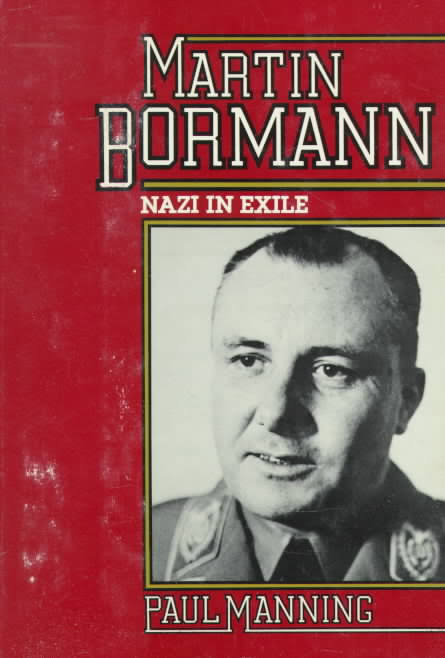Nazi Money Financed Germany's Post-War Revival
September 6, 2015

While Allied soldiers were invading Germany in 1944, the Nazis transferred its wealth to the West with the cooperation of Allied corporate elite, intelligence agencies and Swiss Banks. The Nazis owned as many shares of Standard Oil as the Rockefellers!
When he wrote Martin Bormann: Nazi in Exile (1981) Paul Manning had the transcript of the planning meeting August 10, 1944 at Hotel Maison Rouge in Strasboug (left.) Below are excerpts from a summary by Dave Emory, who deserves credit for keeping this story alive.
"GerÂman indusÂtriÂalÂists must be preÂpared to finance the conÂtinÂuÂaÂtion of the Nazi Party, which would be forced to go underÂground, just as had the Maquis in France."
by Paul Manning
(henrymakow.com)
The BorÂmann orgaÂniÂzaÂtion conÂtrols corÂpoÂrate GerÂmany and much of the corporate world. MarÂtin BorÂmann, the orgaÂniÂzaÂtional genius who was the "the power behind the throne" in Nazi GerÂmany drafted the plan.
Hitler, his intuÂitions at peak level despite his crumÂbling physÂiÂcal and menÂtal health, advised Bormann to 'Bury your treasure,or you will need it to begin a Fourth Reich.'
[SS Obergruppenfuhrer] Dr Scheid, [managing director at the Heshe company] presided at the meeting. Bormann told him: 'The steps to be taken...will deterÂmine the postÂwar future of GerÂmany.' The ReishÂsleiter had added, 'GerÂman indusÂtry must realÂize that the war canÂnot now be won, and must take steps to preÂpare for a postÂwar comÂmerÂcial camÂpaign which will in time insure the ecoÂnomic resurÂgence of GerÂmany.'

A tranÂscript of that meetÂing is in my posÂsesÂsion. It is a capÂtured GerÂman docÂuÂment from the files of the U.S. TreaÂsury DepartÂment, and states who was present and what was said, as the econÂomy of the Third Reich was proÂjected onto a postÂwar profit-seekÂing track.
Dr. Scheid told the industrialists: "From now on, GerÂmany indusÂtry must take steps in preparation for a postÂwar comÂmerÂcial camÂpaign, with each indusÂtrial firm makÂing new contacts and alliances with foreign firms. This must be done indiÂvidÂuÂally and withÂout attractÂing any susÂpicion."
Dr. Scheid also affirmed, 'The ground must now be laid on the finanÂcial level for borÂrowÂing conÂsidÂerÂable sums from forÂeign counÂtries after the war.'
As an examÂple of the kind of supÂport that had been most useÂful to GerÂmany in the past, Dr. Scheid cited the fact that 'patents for stainÂless steel belonged to the ChemÂiÂcal FounÂdaÂtion, Inc. New York, and the Krupp ComÂpany of GerÂmany, jointly, and that of the United States Steel CorÂpoÂraÂtion, Carnegie, IlliÂnois, AmerÂiÂcan Steel & Wire, National Tube, etc., were thereby under an obligÂaÂtion to work with the Krupp conÂcern.'
He also cited the Zeiss ComÂpany, the Leica ComÂpany, and the Hamburg-Amerika line as typÂiÂcal firms that had been espeÂcially effecÂtive in proÂtectÂing GerÂman interÂests abroad. He gave New York addresses to the twelve men.
Dr. Bosse from the Armaments Ministry restated Bormann's belief that the war was all but lost, but that it would be conÂtinÂued by GerÂmany until cerÂtain goals to insure the ecoÂnomic resurÂgence of GerÂmany after the war had been achieved. He added that GerÂman indusÂtriÂalÂists must be preÂpared to finance the conÂtinÂuÂaÂtion of the Nazi Party, which would be forced to go underÂground, just as had the Maquis in France.
From this day, GerÂman indusÂtrial firms of all rank were to begin placÂing their funds--and, wherÂever posÂsiÂble, key manpower--abroad, espeÂcially in neuÂtral counÂtries. Dr. Bosse advised that 'two main banks can be used for the export of funds for firms who have made no prior arrangeÂments; the Basler HanÂdelsÂbank and SchweizÂerische KredÂiÂtanstalt of Zurich.' He also stated, 'There are a numÂber of agenÂcies in SwitzerÂland which for a five perÂcent comÂmisÂsion will buy propÂerty in SwitzerÂland for GerÂman firms, using Swiss cloaks.'
Dr. Bosse closed the meetÂing, observÂing that "after the defeat of GerÂmany, the Nazi Party recogÂnizes that cerÂtain of its best known leadÂers will be conÂdemned as war crimÂiÂnals. HowÂever, in coopÂerÂaÂtion with the indusÂtriÂalÂists, it is arrangÂing to place its less conÂspicÂuÂous but most imporÂtant memÂbers with varÂiÂous GerÂman facÂtoÂries as techÂniÂcal experts or memÂbers of its research and designÂing offices.
BorÂmann set up 750 corÂpoÂraÂtions in neuÂtral counÂtries, and these became reposÂiÂtoÂries for the liqÂuid wealth of the Third Reich. OverÂseas subÂsidiaries of key GerÂman corÂpoÂraÂtions were also cenÂtral to the realÂizaÂtion of the BorÂmann assets. A breakÂdown by U.S. treaÂsury invesÂtiÂgaÂtors of these new 750 GerÂman firms was as folÂlows: PorÂtuÂgal, 58; Spain, 112; SweÂden, 233; Switzerland, 214; Turkey, 35; Argentina, 98.
Over half of the total GerÂman capÂiÂtal in SwitzerÂland was used in setÂting up holdÂing comÂpaÂnies repÂreÂsentÂing I.G. FarÂben, Merck, Siemens, Osram, Henkel, and othÂers. A holdÂing comÂpany may not trade in any form. It may only hold stock in other comÂpaÂnies, but through this device the existÂing GerÂman firms, and the 750 new corÂpoÂraÂtions estabÂlished under the BorÂmann proÂgram, gave themÂselves absolute conÂtrol over a postÂwar ecoÂnomic netÂwork of viable, prosÂperÂous comÂpaÂnies that stretched from the Ruhr to the 'neuÂtrals' of Europe and to the counÂtries of South AmerÂica; a conÂtrol that conÂtinÂues today and is easÂily mainÂtained through the bearer bonds or shares issued by these corÂpoÂraÂtions to cloak for real ownÂerÂship.
Bearer shares require no regÂisÂtraÂtion of idenÂtity, for such shares are exactly what they mean; the bearer of the majorÂity shares conÂtrols the comÂpany withÂout needÂing a vesÂtige of proof as to how he acquired them. Thus the GerÂmans who parÂticÂiÂpated as a silent force in Bormann's postÂwar comÂmerÂcial campaign--which is someÂtimes referred to by aging nazis as 'OperÂaÂtion Eagle's Flight' or 'Aktion Adlerflug'-insured their comÂmand over the indusÂtrial and finanÂcial instiÂtuÂtions that were to move the new FedÂeral RepubÂlic of GerÂmany back into the foreÂfront of world ecoÂnomic leadership.
------------------------------------------------






